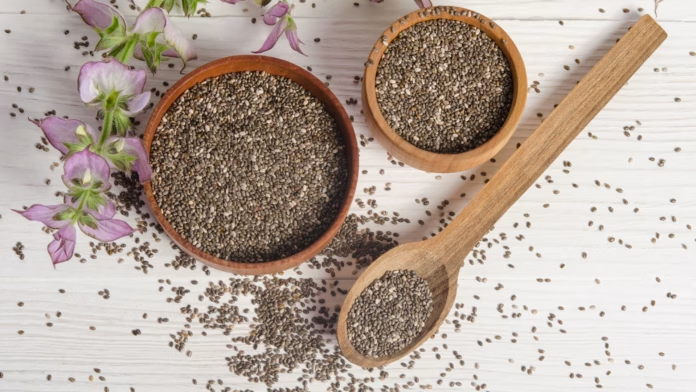Almost every fitness influencer that you might come across on Instagram, might tell you about “chia seed” recipes as they have become increasingly popular in recent years due to their impressive nutritional profile and versatile use in various recipes. These tiny seeds, which are native to Mexico and Guatemala, are a rich source of several essential nutrients and have been associated with a wide range of health benefits.
But just as anything else, even this food is not all white and has its own pros and cons. Let’s find out!
Chia seeds are a nutrient-dense food, meaning they contain a wide variety of essential vitamins, minerals, and other beneficial compounds. Here are the key nutrients found in one ounce (28 grams) of chia seeds:
- Calories: 138
- Protein: 4.4 grams
- Fat: 8.7 grams (including 0.6 grams of saturated fat)
- Carbohydrates: 12.3 grams (including 10.6 grams of fiber and 0.2 grams of sugar)
- Calcium: 177 milligrams
- Magnesium: 64 milligrams
- Phosphorus: 110 milligrams
- Potassium: 44 milligrams
- Zinc: 1.0 milligram
- Vitamin B3 (niacin): 2.5 milligrams
As you can see, chia seeds are a rich source of several essential nutrients, including fiber, protein, calcium, and magnesium. They are also relatively low in calories and carbohydrates, making them an excellent food choice for those looking to maintain a healthy weight or regulate blood sugar levels and they are an excellent source of fiber, which is essential for maintaining digestive health and promoting regular bowel movements.
Chia seeds are one of the best plant-based sources of omega-3 fatty acids and antioxidants, which are essential for brain health and may help to reduce inflammation in the body and are a good and lean source of vegan protein.
Side Effects and Precautions when it Comes to Chia Seeds
While chia seeds are generally considered safe for most people, consuming too many chia seeds can cause some side effects. Here are some of the potential side effects of eating too many chia seeds:
Upsets the Stomach
Chia seeds are high in fiber, which can cause digestive discomfort such as bloating, gas, and abdominal cramping, especially when consumed in large amounts.
Dehydration
Chia seeds absorb water and can swell up to 10 times their size, which can cause dehydration if they are not consumed with enough fluids. They dried up throat is more prone to result in choking of food while eating which sometimes may result in an instant death. That’s why one must be really careful while consuming chia seeds.
Interference with medication absorption
Chia seeds contain a compound called mucilage, which can interfere with the absorption of certain medications.
Blood pressure changes
Since it is known for reducing blood sugar levels, chia seeds contain a high amount of omega-3 fatty acids, which can cause blood thinning and potentially lower blood pressure, leading to dizziness, lightheadedness, or fainting. That’s why it is not recommended for those who particularly have lower blood pressure.
It is essential to keep in mind that these side effects are typically only associated with consuming large amounts of chia seeds regularly. Consuming moderate amounts of chia seeds as part of a balanced diet is generally considered safe for most people.
A Desi Alternative to Chia Seeds- Sabja/Basil Seeds
Yes, sabja seeds (also known as basil seeds or tukmaria) are a popular alternative to chia seeds. Like chia seeds, sabja seeds are rich in fiber, protein, and essential minerals such as calcium, magnesium, and iron. They also have a unique ability to swell up when soaked in water, creating a gel-like substance that can help promote feelings of fullness and aid in digestion.
One significant difference between chia and sabja seeds is their origin. Chia seeds come from a plant native to Mexico and Central America, while sabja seeds come from a plant native to India and Southeast Asia.
Sabja seeds are commonly used in Indian and Southeast Asian cuisine and are often added to drinks such as falooda, a sweet and refreshing milk-based beverage. They can also be used as a substitute for chia seeds in recipes such as smoothies, puddings, and baked goods.
It is essential to note that while sabja seeds offer many of the same nutritional benefits as chia seeds, they may not be suitable for everyone. Like chia seeds, they can cause digestive discomfort if consumed in large amounts, and some people may be allergic to them.





